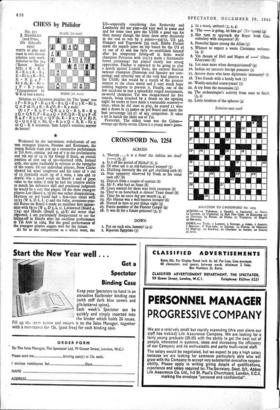CHESS by Philidor
No. 315 J. HANNELIUS (2nd Prize, Die Schwalbe 1) WHITE to950 play and mate in two moves: solution next week. Solution to No. 314 ('Bonus Socius' MS): z K - K 6, K - R 2; 2 K - B 5, K -Kt 1; 3 K - B 6, K - R 2; 4 P - Kt 6 ch, K - Kt I. 5 P - R 7 mate. Triangulation' by W K to lose a move. BLACK (so men)
WHITE (II
Solution to Christmas puzzles: (a) The 'game' was zP-KB3,P-K 4;2 K-B 2,Q-B 3; 3 R-K133 Q x P ch ??; 4 K - R 4???, B - K 2 mate. (b) P - K 3, P - Q R 4; 2 Q - R 5, R - R 3; 3Q x QRP,P-R 4;4 Q x BP,QR-R 3;5 P-K R4,P-B 3; 6 Q x QPch,K-B 2; 7 Q x KtP, Q - Q 6; 8 Q x Kt, Q - R 2; 9 Q x B, K - Kt 3; Io Q - K 6 stalemate. Sam Loyd's solution; anyone do better?
Weakened by the last-minute withdrawals of our two strongest players, Penrose and Kottnauer, the young British team put up a reasonable performance at Tel Aviv, coming 3rd out of 7 in the preliminaries and 7th out of 14 in the Group B finals, an overall position of 21st out of 52—Scotland 28th, Ireland 4oth, also quite creditable in relation to the strengths of the teams. Of our individual players, Peter Clarke showed his usual toughness and his score of 7 out of 13 (typically made up of 2 wins, z loss and zo draws) was a good result on Board z and of great value to the team; if only he had the creative ability to match his defensive skill and positional judgment he would be a very fine player. Of the three youngest players Lee (Board 2, 7i/16) was rather disappointing, Hartsten on 3rd board had a first-class result with 10/15 (W 6, D 8, L i) and the baby, seventeen-year- old Keene on Board 6 made an excellent first appear- ance with 6i/ro (W 4, D 5, L a). Littlewood (Board 4, 7114) and Hindle (Board 5, 4i/8) did worse than ; I am particularly disappointed to see the -off in Hindle after his excellent performance at Tel Aviv in 1964. But the good performance of the youngest players augurs well for the future.
As far as the competition as a whole went, the
US—especially considering that Reshevsky and Lombardy did not play—did very well to come 2nd and for some time gave the USSR a good run for their money though the latter drew away decisively in the end to win by 5 points-391152, US 34i, Hungary and Yugoslavia 33i each. Bobby Fischer made the superb score on top board for the US of 15 out of 17 and has fully re- established himself after his temporary falling-off in form; world champion Petrosian with IIi/I3 made a fractionally better percentage but played clearly less strong opposition. Fischer is reported to be going to play a match against Leonid Stein, the current Russian national champion (Petrosian and Spassky not com- peting) and certainly one of the very best players in the USSR; this would be a match of the greatest interest to the chess world and I very much hope nothing happens to prevent it. Finally, one of the few incidents to mar a splendidly staged tournament, ex-world champion Tal was incapacitated for five rounds, being attacked by a drunk on the opening night: he seems to have made a reasonable recovery— since, when he did start to play, he scored II wins and 2 draws in 13 games on 3rd Board and made the best percentage (92.3!) of any competitor. It takes a lot to knock the chess out of Tal.
Postscript. The oldest team was the Cuban— average age thirty-seven. Chess is a young man's game.






































 Previous page
Previous page